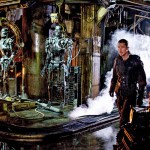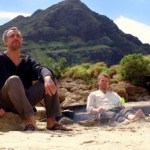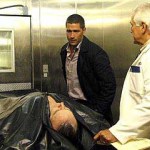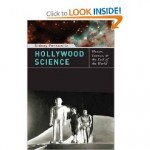Science Fiction
And speaking of reading, a couple of the books on the summer reading list I posted yesterday were actually purchased at the World Science Fiction Convention dealers' room! We were lucky that this year the con was in Montreal, my home town and very near Ste-Agathe, where we spent most of our vacation time. The whole family came down to Montreal for the Friday of the con, while I stayed for Saturday and Sunday as well.
Overall, the con was a blast. I had a fantastic time! Of course, since I lived in Montreal for 38 years and was quite involved in Montreal sf fandom for a few years (I was on…
I'm not a huge fan of the original Tron (floppy-disks in the hiz house!), but Peter Suderman points to an excellent sneak peak.
When I was in graduate school at Cornell, David Kirby was a course mate while he was working on a post-doc in science studies. Kirby was re-training from his former field as a geneticist, researching the influence of science consultants on major motion pictures.
One of his conclusions--published in a paper at the Social Studies of Science--was that science consultants are important to filmmakers because they can help lend a sense of realism and perceived legitimacy to a film, especially among the opinion-setting audience base who shape the success of a film via word-of-mouth and online buzz…
This week's Science Saturday is all about sci fi: John Horgan explores the connections between Battlestar Galactica and Terminator Salvation, George Johnson examines the science and the theology of Angels & Demons, and John and George discuss the nonsense of time travel in some popular science fiction. They also talk about a bit of science non-fiction: the prospects for nuclear fusion power and the recent news about RNA and the origin of life.
So I scanned the reviews for director McG's Terminator Salvation at the Washington Post, New York Times, and New York Magazine, and it turns out not unexpectedly that in the words of my hometown Buffalo News' critic Jeff Simon that the film "is a remarkable looking piece of work. And you'll find gobs and gobs of action in it at least half of the time. Bullets fly, so do people. Things blow up and, yes the people do, too."
But reading the reviews left me thinking: There's so much visual, so much wider audience engagement with a film like Terminator Salvation, that the underlying themes of…
Speaking of "going broad" with science communication, here's something I really like. As part of their Science and Entertainment Exchange initiative, the National Academies has launched The X-Change Files blog with author Jennifer Ouellette, producers Janet & Jerry Zucker, physicist Lawrence Krauss, CSI screenwriter Matt Partney, and physicist Sidney Perkowitz as contributors.
I write about the Science & Entertainment Exchange initiative in several forthcoming articles and spotlight it in talks on the road, so I look forward to following the blog!
Angels & Demons opened this weekend with a less than expected $48 million just edging out the still hot Star Trek ($43M, $150M over two weeks). I took in the film at a 3/4 filled theater in Georgetown.
Angels is worth seeing and a better film version than Davinci Code. The film is also likely to spark conversations among movie-goers on the relationship between science and religion, a theme that is heavy throughout the film and the novel.
Without spoiling the plot, Angels features a Pope inspired by science and who views research on the so-called "God Particle" as a means for engaging the…
The Daily Show With Jon Stewart
M - Th 11p / 10c
Tom Hanks
thedailyshow.com
Daily Show Full Episodes
Economic Crisis
Political Humor
Blockbuster movies, The Daily Show: As I discuss in forthcoming articles, these are the new tools for "going broad" and motivating interest among mass audiences on issues related to science and society. Watch Tom Hanks above have fun and talk some of the implications of Angels and Demons. You can fret over the accuracy of Hanks' banter when it comes to anti-matter, but some portion of the Daily Show audience and the audience for the…
Not only will Angels & Demons likely jump start conversations about physics, as some scientists hope, but the summer blockbuster will also be a launching pad for audiences to drive home discussing the relationship between science and religion.
I'm heading up to Georgetown tonight to check out the film and will have more to report on this angle. But for now, check out this short trailer put together by the Angels & Demon's publicity team addressing the science and religion theme in the film.
Jacob with his black-clad counterpart.
Much was revealed in last night's fifth season finale for Lost, the penultimate for the series. Here's my take:
Apparently Jacob is a Judeo-Christian God-like figure, the "others" and Richard are his angels, and the survivors of Oceanic Flight 815, like many a vessel previously crashed at the island by Jacob, are his human flock. Jacob, or God, appears benevolently in the survivors' off-Island lives, sometimes intervening to save their lives while at other times offering encouragement or reassurance. Yet as Jacob mentions in the season finale, each…
On the road giving talks this spring and in several forthcoming articles, I recommend that one way to widen the net in terms of public engagement is to hook science around entertainment media. A leading initiative I spotlight is the National Academies' Science & Entertainment Exchange which pairs scientists with TV and film producers. A recent success was the incidental news coverage generated by scientific consultation on the movie-version of The Watchmen.
This week comes another great strategy for "going broad" with science communication. As the NSF spotlights, more than 45 lectures are…
In following up in my my earlier post today regarding the season finale for Lost, google traffic to my blog points back to this site which proposes a provocative theory that appears to make a lot sense. Check it out for yourself.
It's the season finale for Lost tonight and the narrative threads are actually seeming to fit together. My only lingering question is where exactly Jack's father fits in the mysterious mosaic of the island. What do readers think?
Is Jack's father Jacob, as someone suggested to me the other day? Doubt it, but it seems we should find out more on this angle tonight.
Trekkies Bash New Star Trek Film As 'Fun, Watchable'
The only thing missing from the pitch perfect new Star Trek film is a strong soundtrack. The actors have been brilliantly cast and Zachary Quinto as Spock steals the show. The theaters in Georgetown last night were packed, and not by your typical Trekkie crowd. It looked like the film had broad demographic appeal. Expect Star Trek to make more than $70 million this weekend, tops for the eleven film series.
Still, as the news clip above indicates, hardliner Trek fans are apparently disappointed that the newest version lacks a heavy handed…
Science Not Fiction has a review of Kröd Mandöon And The Flaming Sword Of Fire:
In Robin Hood fashion, the insecure hero, Kröd Mandöon (played by Sean Maguire), leads the struggle against the evil rule of Dongalor, a local king with big ambitions. Kröd is aided by a none-too-bright pig-man, an utterly ineffective wizard, the very gay Bruce, and his sexually liberated pagan warrior girlfriend. (A note on these last two characters--there's a very fine line between ironically parodying how women or homosexuals are portrayed in a genre, and simply exploiting stereotypes anew. Once…
I watched Clockwork Orange a few months ago. More recently I've been reading some economic history, as well as the utopian visions of early 19th century reformers. From these two vantage points I've come to the conclusion that the whole genre of "dystopia" is really about lowered expectations. Modern Western man after the Great Divergence actually lives in what would be a utopia to anyone in the 19th century; after all obesity related illnesses are a major problem for the underclasses in Western societies! Future dystopias in reality simply resemble the social structure and quality of…
Today's free book is "Hollywood Science: Movies, Science, and the End of the World" by Sydney Perkowitz. (If you click over the Amazon page linked above, you'll see a review by scibling Brian Switek of Laelaps.)
Remember: To claim the book, be the first commenter to earnestly affirm that you will read and review the book in less than 6 months. Then send me your snail mail address via my science (dot) woman account on google's mail service.
I love Ursula K. le Guin's the Earthsea series, and recently finished reading the final novel, The Other Wind. Those who are familiar with the Earthsea books will know that among other topics, le Guin explores traditional gender roles, their change, and men's disparagement of women's power. Towards the end of The Other Wind, one of the characters, Tenar, observes
How men feared women! she thought, walking among the late-flowering roses. Not as individuals, but women when they talked together, worked together, spoke up for one another - then men saw plots, cabals, constraints, traps being…
Let's say we're having a nice day here on Earth; the Sun is shining, the clouds are sparse, and everything is just looking like a peach:
And then Lucas goes and tells me,
Oh my God, Ethan! It's Armageddon! An asteroid is coming straight for us! You've got to stop it!
Really? Me? Well, how would I do it? Let's say we've got some reasonably good asteroid tracking going on, and we've got about 2 months before the asteroid is actually going to hit us. We'd like to do something with the situation on the left, to avoid the situation on the right:
Well, what we really have to do is change the…
tags: global warming, LabLit, science fiction, book review
I read the first two books in this trilogy last year [book 1 and book 2] and ever since I finished them, I had wondered; and then what happened? Well, now I know the answer to this question, and I can honestly say that this, the third of three books, made the entire trilogy into a huge disappointment, even though the series started out by showing some promise. Sixty Days And Counting by Kim Stanley Robinson (NYC: Bantam Books; 2007) is the last installment in a eco-political near-future sci-fi thriller trilogy. This particular book's…




